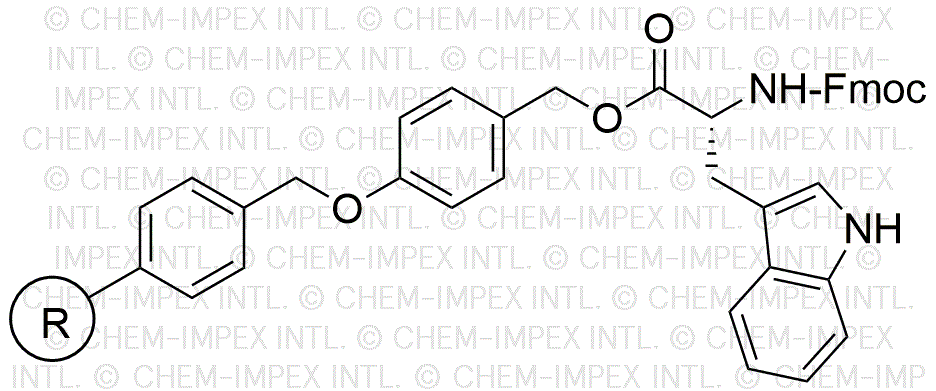Na-Fmoc-D-tryptophan 4-alkoxybenzyl alcohol resin is widely utilized in research focused on:
- Peptide Synthesis: This resin is essential in solid-phase peptide synthesis, allowing for the efficient assembly of peptides. Its properties facilitate the easy removal of protecting groups, streamlining the synthesis process.
- Drug Development: Researchers in pharmaceutical industries use this resin to create peptide-based drugs, particularly those targeting specific receptors. Its compatibility with various coupling reagents enhances the development of novel therapeutics.
- Bioconjugation: The resin is valuable in bioconjugation applications, where peptides are linked to other biomolecules. This is crucial for creating targeted drug delivery systems, improving therapeutic efficacy.
- Research in Neuroscience: Given the role of tryptophan in serotonin production, this resin is used in studies exploring neurochemical pathways, aiding in the development of treatments for mood disorders.
- Custom Peptide Libraries: This resin enables the creation of diverse peptide libraries for screening potential drug candidates, allowing researchers to identify promising compounds more efficiently.
General Information
Properties
Safety and Regulations
Applications
Na-Fmoc-D-tryptophan 4-alkoxybenzyl alcohol resin is widely utilized in research focused on:
- Peptide Synthesis: This resin is essential in solid-phase peptide synthesis, allowing for the efficient assembly of peptides. Its properties facilitate the easy removal of protecting groups, streamlining the synthesis process.
- Drug Development: Researchers in pharmaceutical industries use this resin to create peptide-based drugs, particularly those targeting specific receptors. Its compatibility with various coupling reagents enhances the development of novel therapeutics.
- Bioconjugation: The resin is valuable in bioconjugation applications, where peptides are linked to other biomolecules. This is crucial for creating targeted drug delivery systems, improving therapeutic efficacy.
- Research in Neuroscience: Given the role of tryptophan in serotonin production, this resin is used in studies exploring neurochemical pathways, aiding in the development of treatments for mood disorders.
- Custom Peptide Libraries: This resin enables the creation of diverse peptide libraries for screening potential drug candidates, allowing researchers to identify promising compounds more efficiently.
Documents
Safety Data Sheets (SDS)
The SDS provides comprehensive safety information on handling, storage, and disposal of the product.
Product Specification (PS)
The PS provides a comprehensive breakdown of the product’s properties, including chemical composition, physical state, purity, and storage requirements. It also details acceptable quality ranges and the product's intended applications.
Certificates of Analysis (COA)
Search for Certificates of Analysis (COA) by entering the products Lot Number. Lot and Batch Numbers can be found on a product’s label following the words ‘Lot’ or ‘Batch’.
*Catalog Number
*Lot Number
Certificates Of Origin (COO)
This COO confirms the country where the product was manufactured, and also details the materials and components used in it and whether it is derived from natural, synthetic, or other specific sources. This certificate may be required for customs, trade, and regulatory compliance.
*Catalog Number
*Lot Number
Safety Data Sheets (SDS)
The SDS provides comprehensive safety information on handling, storage, and disposal of the product.
DownloadProduct Specification (PS)
The PS provides a comprehensive breakdown of the product’s properties, including chemical composition, physical state, purity, and storage requirements. It also details acceptable quality ranges and the product's intended applications.
DownloadCertificates of Analysis (COA)
Search for Certificates of Analysis (COA) by entering the products Lot Number. Lot and Batch Numbers can be found on a product’s label following the words ‘Lot’ or ‘Batch’.
*Catalog Number
*Lot Number
Certificates Of Origin (COO)
This COO confirms the country where the product was manufactured, and also details the materials and components used in it and whether it is derived from natural, synthetic, or other specific sources. This certificate may be required for customs, trade, and regulatory compliance.

